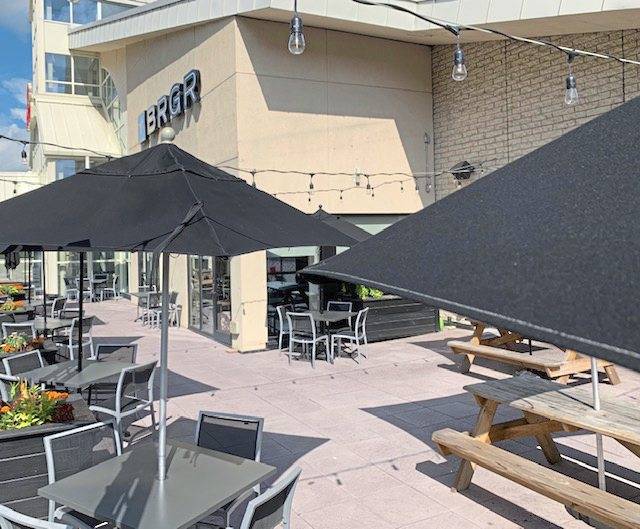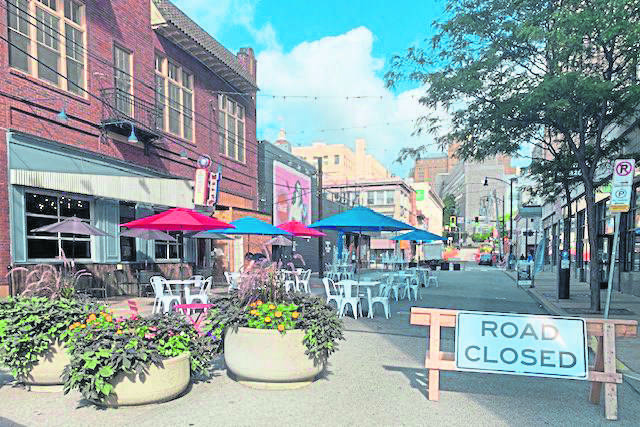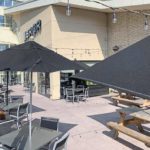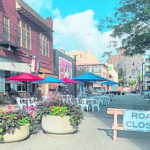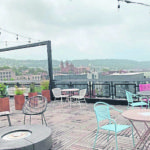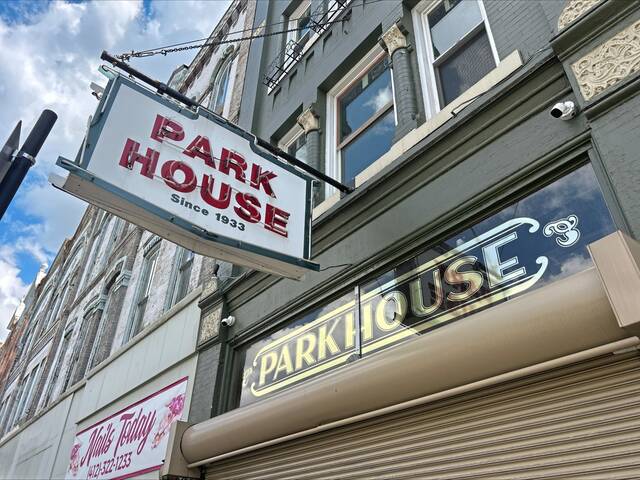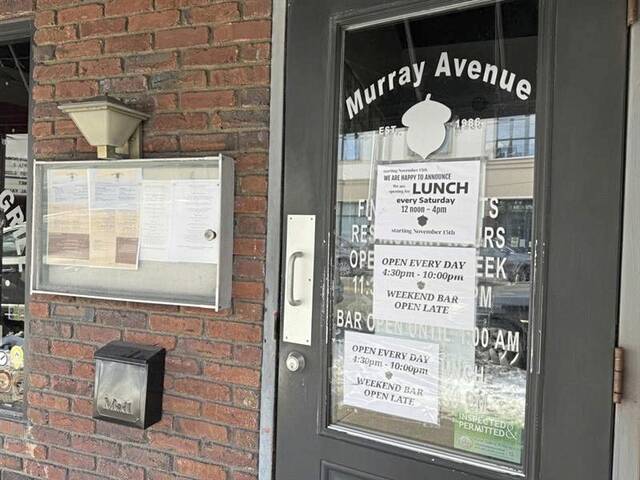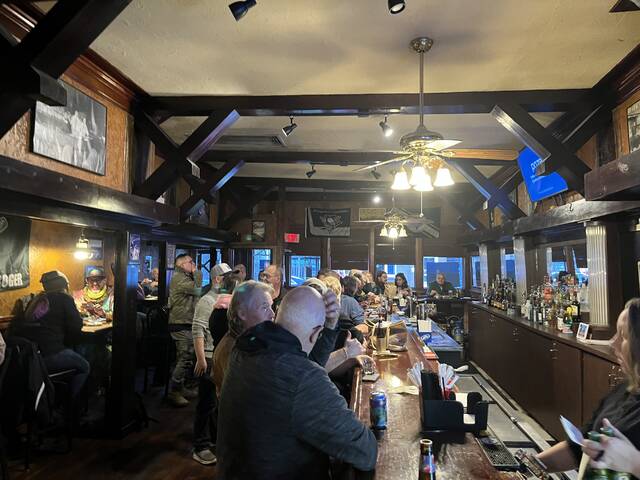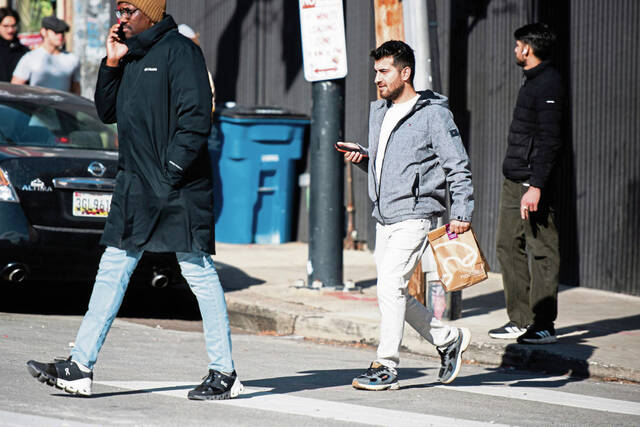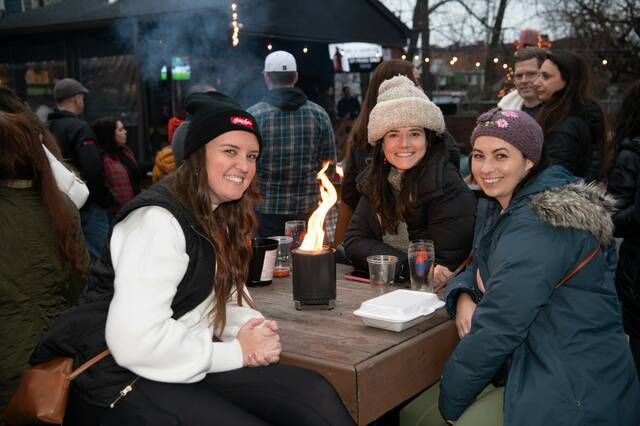When chef and restaurateur Brian Pekarcik contemplated how his two BRGR restaurants should approach this fall and winter, he thought of the restaurants’ perennial favorites: the Gobble Gobble turkey burger, a spiked pumpkin milkshake and a warmly spiced rum cocktail, among others.
He also thought about covid-19 dining restrictions, many patrons’ desire to eat outside and the challenges of keeping them warm.
He isn’t alone.
While the pandemic summer led to plenty of outdoor dining innovation from the minds of restaurateurs, executive chefs and municipalities, those same problem solvers — outdoor tents, cordoned-off parking lots and closed streets — present new challenges as the weather cools.
With covid’s steady threat expected to last for several more months, it’s widely understood that restaurant operators have again been challenged to insulate themselves.
Chicago officials have launched a Winter Design Challenge, with a $5,000 prize, to encourage cool-weather, outdoor dining space innovation. In Washington, D.C., the Office of Nightlife and Culture is offering $6,000 grants for similar efforts.
While no such support is being offered locally, the urgency is unchanged.
BRGR Mt. Lebanon is situated on the second floor of the Galleria of Mt. Lebanon mall. With its patio above two other storefronts, a temporary tent isn’t logistically possible and neither is a permanent awning, quoted at around $125,000.
Pekarcik has ordered eight outdoor, propane heaters so far, knowing more might be necessary. He’s also considering BRGR-branded blankets at a cost or blankets provided by their linen company that can be laundered between uses.
“If someone requests a blanket out under the heater, we could provide one to offer an additional layer of warmth,” he said.
But the tall, lantern-looking propane heaters present problems of their own.
Ryan Gorka, general manager of the Downtown Pittsburgh restaurant or, The Whale, has learned outdoor heater lessons, leading to this tip: They’re best used in conjunction with a tent, and unless all sides of the tent are down, the heat only extends a few feet in any direction.
That’s a problem when combined with social distancing.
“If every table is six feet apart, you’re going to need a heater for almost every table, if you’re doing it properly,” he said.
For plenty of restaurant owners, like Brandon Smith of Oakland’s Fuel and Fuddle and Scott Smith (no relation) of East End Brewing Co. in Larimer, such an investment doesn’t make financial sense.
“You can buy those heaters online for $150, but it’s going to cost you $20 per day per heater for propane; so, it’s not economical for us to buy 10 heaters,” Brandon Smith said.
“Heating the outside isn’t practical or cost-effective for us,” said Scott Smith. “And, tenting the outside would be a huge cost and essentially just turn it into an indoor space.”
Gov. Tom Wolf’s guidance on outdoor dining tents states that only one side of a tented area may be enclosed in order for it to be an “outdoor space.” However, now that self-certified restaurants may occupy indoor spaces at 50%, indoor and outdoor spaces can be populated similarly in many cases, effectively making the difference null.
“Outdoor seating has never been changed and remains at 24 people per 1,000 square feet, assuming there is no fire code capacity listed, which is usually the case,” said John Longstreet, president and CEO of the Pennsylvania Restaurant & Lodging Association, whose organization continues to lobby the governor for less strict regulations. “We’re told that 24 people per 1,000 square feet is roughly equivalent to 50% of fire code in many cases.”
Pittsburgh restaurants that have expanded their outdoor dining capacity by adding tables to sidewalks or closed streets have done so via permit through the Department of Mobility and Infrastructure. Those permits typically involve the stamp of an engineer or architect and several other time-consuming (and safety-assuring) steps, but the city has helped streamline that process through the pandemic.
“We went to city council and asked for a waiver from the standard process that allowed us to do it with drawings that were slightly more sophisticated than a cocktail napkin,” said DOMI Director Karina Ricks. “Desperate times call for desperate measures.”
While DOMI intends to extend the sidewalk and street use permits when requested, methods of warming those diners must clear their own hurdle: another permit.
“We really don’t want people to go rogue in the public right of way, especially where it concerns highly flammable/explosive gases,” said Ricks.
While those permits are issued through a different city department, she said that each method of heating comes with its own considerations. Propane involves storage, supply, filling and environmental concerns. Gas lines would have to be temporary and mobile. Electrical heating might compromise utility loads.
They all must prioritize public safety.
“Several of the employees and members of ownership have lived in cold-weather cities, like colder than Pittsburgh: We’ve been places where they kind of embrace it,” said Kevin Costa, executive chef of Lawrenceville’s Over Eden restaurant.
Over Eden opened last year on the rooftop of the new TRYP Hotel, with a large outdoor patio. Costa plans on encouraging warmth with activity, like cornhole, and food and bar menu switch-ups to “hot, comforting things.”
At Church Brew Works in Lawrenceville — which has hosted a Winter Fest in the past — owner Sean Casey said outdoor guests might need to toughen up.
“Lord knows you have 60,000 people having a beer and a brat at a Steelers game and hang in the parking lot before the game,” he said. “We can probably get them to some of the restaurant patios as well. Take a negative and turn it into a positive.”
Regardless of the method, extending the patio season and keeping those diners comfortable is perhaps the hottest of topics at the moment.
“Of course we’re having a fall that’s earlier than what it’s been in the past,” said Pekarcik. “With the way 2020 is going and restaurants’ luck, we’re going to have snow at the beginning of November.”


